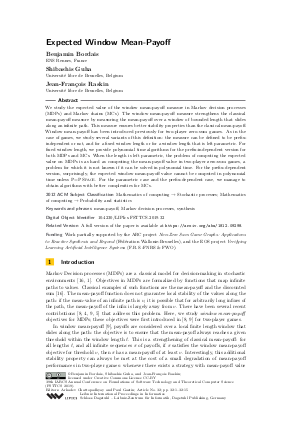Expected Window Mean-Payoff
Authors Benjamin Bordais, Shibashis Guha, Jean-François Raskin
-
Part of:
Volume:
39th IARCS Annual Conference on Foundations of Software Technology and Theoretical Computer Science (FSTTCS 2019)
Part of: Series: Leibniz International Proceedings in Informatics (LIPIcs)
Part of: Conference: IARCS Annual Conference on Foundations of Software Technology and Theoretical Computer Science (FSTTCS) - License:
 Creative Commons Attribution 3.0 Unported license
Creative Commons Attribution 3.0 Unported license
- Publication Date: 2019-12-04
File

PDF
LIPIcs.FSTTCS.2019.32.pdf
- Filesize: 0.61 MB
- 15 pages
Document Identifiers
Related Versions
-
A full version of the paper is available at https://arxiv.org/abs/1812.09298.
Subject Classification
ACM Subject Classification
- Mathematics of computing → Stochastic processes
- Mathematics of computing → Probability and statistics
Keywords
- mean-payoff
- Markov decision processes
- synthesis
Metrics
- Access Statistics
-
Total Accesses (updated on a weekly basis)
0Document
0Metadata
Abstract
We study the expected value of the window mean-payoff measure in Markov decision processes (MDPs) and Markov chains (MCs). The window mean-payoff measure strengthens the classical mean-payoff measure by measuring the mean-payoff over a window of bounded length that slides along an infinite path. This measure ensures better stability properties than the classical mean-payoff. Window mean-payoff has been introduced previously for two-player zero-sum games. As in the case of games, we study several variants of this definition: the measure can be defined to be prefix-independent or not, and for a fixed window length or for a window length that is left parametric. For fixed window length, we provide polynomial time algorithms for the prefix-independent version for both MDPs and MCs. When the length is left parametric, the problem of computing the expected value on MDPs is as hard as computing the mean-payoff value in two-player zero-sum games, a problem for which it is not known if it can be solved in polynomial time. For the prefix-dependent version, surprisingly, the expected window mean-payoff value cannot be computed in polynomial time unless P=PSPACE. For the parametric case and the prefix-dependent case, we manage to obtain algorithms with better complexities for MCs.
Cite As Get BibTex
Benjamin Bordais, Shibashis Guha, and Jean-François Raskin. Expected Window Mean-Payoff. In 39th IARCS Annual Conference on Foundations of Software Technology and Theoretical Computer Science (FSTTCS 2019). Leibniz International Proceedings in Informatics (LIPIcs), Volume 150, pp. 32:1-32:15, Schloss Dagstuhl – Leibniz-Zentrum für Informatik (2019)
https://doi.org/10.4230/LIPIcs.FSTTCS.2019.32
BibTex
@InProceedings{bordais_et_al:LIPIcs.FSTTCS.2019.32,
author = {Bordais, Benjamin and Guha, Shibashis and Raskin, Jean-Fran\c{c}ois},
title = {{Expected Window Mean-Payoff}},
booktitle = {39th IARCS Annual Conference on Foundations of Software Technology and Theoretical Computer Science (FSTTCS 2019)},
pages = {32:1--32:15},
series = {Leibniz International Proceedings in Informatics (LIPIcs)},
ISBN = {978-3-95977-131-3},
ISSN = {1868-8969},
year = {2019},
volume = {150},
editor = {Chattopadhyay, Arkadev and Gastin, Paul},
publisher = {Schloss Dagstuhl -- Leibniz-Zentrum f{\"u}r Informatik},
address = {Dagstuhl, Germany},
URL = {https://drops.dagstuhl.de/entities/document/10.4230/LIPIcs.FSTTCS.2019.32},
URN = {urn:nbn:de:0030-drops-115940},
doi = {10.4230/LIPIcs.FSTTCS.2019.32},
annote = {Keywords: mean-payoff, Markov decision processes, synthesis}
}
Author Details
Funding
Work partially supported by the ARC project Non-Zero Sum Game Graphs: Applications to Reactive Synthesis and Beyond (Fédération Wallonie-Bruxelles), and the EOS project Verifying Learning Artificial Intelligence Systems (F.R.S.-FNRS & FWO).
References
-
Christel Baier and Joost-Pieter Katoen. Principles of model checking. MIT Press, 2008.

- Benjamin Bordais, Shibashis Guha, and Jean-François Raskin. Expected Window Mean-Payoff. CoRR, abs/1812.09298, 2018. URL: http://arxiv.org/abs/1812.09298.
-
Tomás Brázdil, Václav Brozek, Krishnendu Chatterjee, Vojtech Forejt, and Antonín Kucera. Two Views on Multiple Mean-Payoff Objectives in Markov Decision Processes. Logical Methods in Computer Science, 10(1), 2014.

-
Tomás Brázdil, Krishnendu Chatterjee, Vojtech Forejt, and Antonín Kucera. Trading performance for stability in Markov decision processes. J. Comput. Syst. Sci., 84:144-170, 2017.

-
Tomás Brázdil, Vojtech Forejt, Antonín Kucera, and Petr Novotný. Stability in Graphs and Games. In 27th International Conference on Concurrency Theory, CONCUR 2016, August 23-26, 2016, Québec City, Canada, volume 59 of LIPIcs, pages 10:1-10:14. Schloss Dagstuhl - Leibniz-Zentrum fuer Informatik, 2016.

- Thomas Brihaye, Florent Delgrange, Youssouf Oualhadj, and Mickael Randour. Life is Random, Time is Not: Markov Decision Processes with Window Objectives. CoRR, abs/1901.03571, 2019. URL: http://arxiv.org/abs/1901.03571.
-
Véronique Bruyère, Quentin Hautem, and Jean-François Raskin. On the Complexity of Heterogeneous Multidimensional Games. In 27th International Conference on Concurrency Theory, CONCUR 2016, August 23-26, 2016, Québec City, Canada, volume 59 of LIPIcs, pages 11:1-11:15. Schloss Dagstuhl - Leibniz-Zentrum fuer Informatik, 2016.

-
Krishnendu Chatterjee, Laurent Doyen, Mickael Randour, and Jean-François Raskin. Looking at Mean-Payoff and Total-Payoff through Windows. In Automated Technology for Verification and Analysis - 11th International Symposium, ATVA 2013, Hanoi, Vietnam, October 15-18, 2013. Proceedings, volume 8172 of Lecture Notes in Computer Science, pages 118-132. Springer, 2013.

-
Krishnendu Chatterjee, Laurent Doyen, Mickael Randour, and Jean-François Raskin. Looking at mean-payoff and total-payoff through windows. Inf. Comput., 242:25-52, 2015.

-
Krishnendu Chatterjee and Monika Henzinger. Efficient and Dynamic Algorithms for Alternating Büchi Games and Maximal End-Component Decomposition. J. ACM, 61(3):15:1-15:40, June 2014.

-
Luca De Alfaro. Formal Verification of Probabilistic Systems. PhD thesis, Stanford University, Stanford, CA, USA, 1998.

-
Christoph Haase and Stefan Kiefer. The Odds of Staying on Budget. In Automata, Languages, and Programming - 42nd International Colloquium, ICALP 2015, Kyoto, Japan, July 6-10, 2015, Proceedings, Part II, pages 234-246, 2015.

-
Paul Hunter, Guillermo A. Pérez, and Jean-François Raskin. Looking at mean payoff through foggy windows. Acta Inf., 55(8):627-647, 2018.

-
Marcin Jurdzinski. Deciding the Winner in Parity Games is in UP ∩ co-UP. Inf. Process. Lett., 68(3):119-124, 1998.

-
Richard M. Karp. A characterization of the minimum cycle mean in a digraph. Discrete Mathematics, 23:309-311, 1978.

-
Martin L. Puterman. Markov Decision Processes: Discrete Stochastic Dynamic Programming. John Wiley & Sons, Inc., New York, NY, USA, 1st edition, 1994.

-
Moshe Y. Vardi. Automatic Verification of Probabilistic Concurrent Finite-State Programs. In 26th Annual Symposium on Foundations of Computer Science, Portland, Oregon, USA, 21-23 October 1985, pages 327-338. IEEE Computer Society, 1985.

-
Uri Zwick and Mike Paterson. The complexity of mean payoff games on graphs. Theoretical Computer Science, 158(1-2):343-359, 1996.

